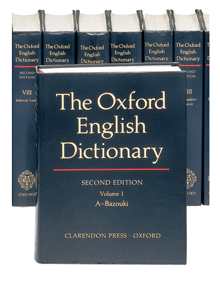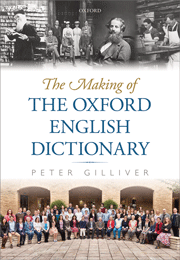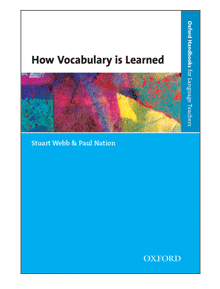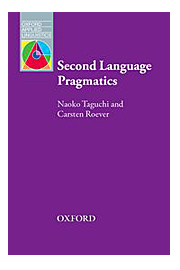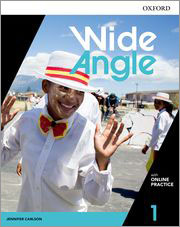Ask the Experts - Oxford University Press, Japan
Interview with Peter Gilliver
posted on Feb 20, 2018

Peter Gilliver has been an editor of the Oxford English Dictionary (OED) since 1987, and is now one of the Dictionary's most experienced lexicographers; he has also contributed to several other dictionaries published by OUP. He has written and published widely on the history of the OED; his book The Making of the Oxford English Dictionary was published by OUP in 2016. He is also the co-author (with Jeremy Marshall and Edmund Weiner) of The Ring of Words: Tolkien and the Oxford English Dictionary (2006).
Peter: The OED is different because it tries to do a different thing. Instead of just telling you all the meanings of a word that you might use today, it tells you the whole history of each word, which can be absolutely fascinating when a word has been in English for 600 or 800 years. Over that time a word may have changed in meaning and to know exactly what it means at different times can be useful for all sorts of reasons. No other dictionary in the English language tries to be historical in that way. There are dictionaries like it in other languages, but for English it's unique.
Peter: We do have a kind of selection process, but a word is never deliberately left out. It's just that we might not have enough evidence yet for a word. A word is drawn to our attention and then it goes through a series of assessments looking to see how widely it's used and for how long a period it's been used and when we can see a word has become firmly established in the English language over a particular period, then we can start researching it for probable inclusion in the dictionary. The kind of evidence we need is statistically how frequent is it, are there lots of examples and do they cover generally 10 years, so that we've got time to see whether a word has bedded down in the language. With some words it's very clear even when they're less than 10 years old that they are going to become part of the language. We look at a word's durable impact as measured in real examples of the word.
Peter: There is a place on the OED website where people can make submissions of any kind, whether it's a new word or they want to tell us something about one of our existing entries because they know it's older or it's still in use. When we describe a word as obsolete, they can tell us, "No I tell can tell you it's still in use in Newfoundland." People tell us things about the English language because of the reputation of the OED as the place that records facts about the history of the English language. Anybody who discovers something about the English language may well choose to write to us, to email us, send it to our website. They can do it in lots of ways.
Peter: There are 2 questions really. One is how the book, the OED, changed and the other is how has compiling the OED changed. As for compiling the dictionary, if you compare what we do and what James Murray and his colleagues did, in some ways it has changed out of all recognition because the only way that they could collect evidence was by having some people read particular books and write things on bits of paper, and that as a way of sampling the whole of the English language is very limited, whereas now you can search not just databases of English written today but databases of historical English as well so with a few keystrokes you can get a lot of evidence. So in some ways it has changed out of all recognition, however in some ways it's not changed at all because what he and his fellow lexicographers did and what we do is just the same. We look at evidence for how a word is used, we read it, we try to understand what that is telling us and then we write it down in a definition or a series of definitions. So that mental process is the same, it's just that the resources and data that we can apply it to have changed. In some ways of course it's an advantage to have much more data, and in some ways it's like being deafened because you hear everything that going on in the English language all at the same time.
The book, I suppose, is still a book in the sense that every entry in the dictionary has a beginning and an end, and we could print it out. At the moment, if you want the revised or new entries they're only available online, but we could print it out. I'm not sure what the point of printing it out would be because as soon as you print it out, you revise the entries when someone sends in some new information.
Peter: Well not long after starting work on the OED I became interested in its history. I think most people who work on the OED become conscious of being part of a long history. Specifically with the OED it's that sense of it's just one team of people who have been doing the same thing over 150 years, and I feel I am a successor to these people and I just wanted to know more about the process and how it came to be written. When I started I knew there was one very good book about the OED, a biography of James Murray written by his granddaughter, called Caught in the Web of Words. It's very good but it was written in 1977 so there's a lot of history it doesn't cover and I thought we need a new thorough academic history of the OED. There is another book published by OUP called The Meaning of Everything, by Simon Winchester, which covers the history of the OED, but it's a different kind of book It's a book for a more popular audience. I know Simon, he is a good friend of mine and I think we can both agree we have written different books. The Meaning of Everything is for people who want an introduction to the history of the dictionary and it's a very interesting read and a very informative book. But there will also be people who want the detail, and that's my book.
As to what I learned about the OED, to be honest, almost everything I know about the history of the OED I didn't know before I started. I knew about Dr. Minor, but I didn't know about the other mad folk who worked on the dictionary. Now people say, "Don't you think there is some kind of connection between lexicography and mental health issues?", and I don't think so. If you read my book you will come across several people who have some kind of mental health problem including a couple of seriously mad people. But if you look at the number of people that have had some connection to the OED, then I don't know statistically there's a lot. I think it's probably that they stick in the mind.
There was one guy who became convinced that his land lady was trying to poison him and he came into the office one day and accused James Murray of being in on the plot. In the 1950's there was a man who was being lined up to edit the supplement for the OED and he'd already proved to be a very difficult character, but just before he took the job on he had a break down, or as he would say a revelation to the secret of the universe, and had to be relieved of his job.
There were lots of colorful characters but there were also people like Arthur Maling, who submitted entries using recycled stuff. He recycled chocolate wrappers, he recycled circulars that he was sent. Junk mail of the time! It's clear that he had some connection with the blind because among his entries were cut up pamphlets about charities for the blind and I noticed a few slips had brail on them, hand-done brail. He must have had some kind of brail machine, so that makes it seem likely to me that he had some kind of relative he really wanted to communicate with. I don't know why he had one, but he had a brail machine and he was also interested in Esperanto, because he used to get book jackets from some books translated into Esperanto which he recycled. All these things come together. Slips of paper which were reused for dictionary entries but on the back of them he had used his brail machine to draw pictures of a biplane taking off. Each stage of the process, the plane on the ground, in the air and so on had a little caption, some of which were in Esperanto. So what a colorful character! I had an interest in Esperanto when I was young so it was fun to find he was an Esperantist, fun to find he played the piano and he used the dusk jackets from piano pieces to write his dictionary entries, and the chocolate of course. So good old Arthur Maling!
They're not all interesting in the same way, but there are so many individuals, and something that really came through as I worked on the dictionary is that this is something created by a large number of individuals and they tend to get overlooked in the general story. There's James Murray, and everybody knows about James Murray, but all the other individuals are worth investigating.
Peter: Almost every lexicographer I know doesn't like this question because one of the things that make you a good lexicographer is that you can find something interesting out of whatever you're working on, so I know some of my colleagues may answer this question with, "The one I'm working on right now." However, I do have a word that I would be happy to call my favorite and it is in fact a word borrowed into English from a foreign language, not Japanese, but if you want a Japanese word, I like "Karaoke" because I think the image of an empty orchestra, which is what the word comes from, is a really vivid image for what karaoke is.
My favorite word is twiffler. I learned this word from someone working on pottery terms from a part of England who wrote to us and said they had come across it. I like this word for many reasons, one of which is that it fills a gap in my vocabulary because before I came across this word I didn't know there was a name for this thing, and now that I do it's really useful. Quite a lot of words that I come across for the first time are not useful to me because I've already got words for the things that I need. If you've got a dinner plate, and a side plate, what's the plate that's intermediate in size between the two? That is a twiffler. I think it's a fantastic word. It fills a gap, it's quite a sort of cuddly word in shape, and the entomology, the origin of the word, is also why I like it because it comes from Dutch, like a lot of words to do with pottery.Twijfelaar is the Dutch form which means the same thing, this kind of plate, but it also means something more general, namely something that's intermediate in size, and twijfeleen is the Dutch word to be in doubt, to be unsure. So this is a plate that can't make up its mind and I think that's really cute. So it's a pleasing word in terms of its shape, it's a useful word because it fills a gap, and I can honestly say, "We're having some friends around for dinner, shall we serve the first course of side dishes or twifflers?" It's a perfectly ordinary thing in our household.
-- interviewed on Oct 20, 2017
Interview with Paul Nation
posted on March 22, 2018
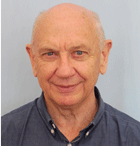
Paul Nation, author of How Vocabulary is Learned: Oxford Handbooks for Language Teachers, is Emeritus Professor in Applied Linguistics at Victoria University of Wellington, New Zealand.
Paul: There are two main factors which really matter. The first is repetition, which is the quantity factor, and the second is the quality factor, which is the quality of each meeting with a word. It's possible to look at how you meet a word. Do you meet it in graded reading? Do you meet it in a speaking activity? Is the form of the word and the nature of its context exactly the same as you've seen before or different? Are you doing any analysis of the word when you meet it? There's a whole range of sub-factors of the quality which we can use to indicate or measure the depth of the quality of the meeting. And so primarily what matters is how often you meet words, and the more often the better, and secondly, that the quality of those meeting should be a mixture of depth and ideally fairly deep and thoughtful meetings.
The interesting thing for me about that is you can then look at a whole range of activities which provide opportunities for vocabulary learning, and then you can analyze them to see what opportunities for repetition are provided and what the quality of the meeting of the word is in a particular activity.
So if we look at extensive reading for example, when someone meets a word in extensive reading if they've meet it before they've got a chance to do a retrieval of what they already know about the word and if they do know a little bit about it, making that retrieval is a very significant step to learning. Also, the word is highly likely to be in a different context from how it was met before. So when you meet words in graded reading the same word doesn't always stay in the same context. If you do a concordance of words in graded readers or books, you find they keep occurring in a whole variety of different contexts. And the variety of the context also adds to the depth of the quality of the meeting and so something which seems fairly passive like extensive reading is really quite good because it provides opportunity for retrieval, but it's also providing opportunity for what I call varied meetings with the word. You are meeting the word in an increasing number of different contexts. Context can mean the word can have ‘ing' or ‘s' on the end and that can be with different collocations and it can be used with a slightly different sense from before. That sort of variety deepens and enriches the learning of the word. It's possible to take any sort of activity and analyze it for the vocabulary opportunities.
Paul: There is but you need to distinguish between reception and production here. For productive uses of the language, speaking and writing, you can actually get by with a relatively small number of words. In the 1930's and 40's Michael West developed what he called the minimum adequate vocabulary, at that was about 1,400 words. He recommended that with those 1,400 words you could just about say most things in non-technical areas. Even if you go a bit higher to around 2,000 words, you can do a lot with 2,000 words in production. The problem is when people speak back to you, you don't have any control over what they are saying. You‘ve got to deal with the vocab coming in. For productive purposes you can have a small very effective vocabulary, but for reception, you need about 5,000-6,000 words for listening and about 8,000-9,000 for reading. With that vocabulary size you don't have to keep rushing off to a dictionary or getting help with the words, you can usually cope pretty well. People can cope with smaller vocabulary sizes but they will just experience more difficulty.
One of the holy grails in vocabulary studies is what proportion or words in a text do you need to know in order for that text to be comprehensible. The research has indicated somewhere around 98% to 99%. But there are a whole lot of other factors which affect comprehension beside vocabulary.
Paul: For EFL there are many differences, for example deliberate learning from word cards which adults can happily do, whereas kids may struggle to see the point of them. For ESL I'm sure there is a major difference between adult and young learners because when English is a second language and you're living in the country where the language is spoken, kids just shoot ahead of adults. I tested the vocabulary size of a couple of young kids of a colleague of mine, who had come to New Zealand not speaking a word of English and 4 years later they knew around 6,000 words. So that means that each year on average they learned about 1,250 words a year roughly. They were like native speakers after 4 years. This is not especially exceptional because you would expect native speakers to learn about 1,000 words a year, but these kids were on a slightly faster pace, mainly because they needed to keep up with their classmates. So we would expect children in that situation to learn quite rapidly whereas adults tend to not be able to do the same kinds of learning that kids do. There are a few exceptional ones who do, but usually adults work away much more consciously. There's a whole variety of explanations that try to explain why this happens but I think there is no definitive explanation yet.
Paul: Low level learners can also be sometimes low motivation learners and with low level and low motivation students, it is really important to have a balance of activities and teaching should only play a very minor role in that balance of activities. It still baffles me why even in Japan, which in my opinion leads the world on extensive reading, extensive reading programs are the exception not the rule. Learning through extensive reading is one very good vocabulary learning source and it's one that can really motivate learners too. Once learners realize there are books at their level which they can read and comprehend and the books are actually quite interesting, they can get quite hooked on reading. Teaching still tends to dominate vocabulary learning, and teaching is not very effective.
If you're dealing with low level learners who also struggle with low motivation, you really need to have a balance across what I call the 4 strands, learning from input, learning form output, deliberate learning and fluency development. And make sure that they try and capture the student's interest and motivation by dealing with each of those 4 strands in an engaging way.
For me the number one change anyone can make to an EFL language program is to include extensive reading. It's number one in terms of having the greatest possible effect.
Paul: I think they're very important. You have people advocating extensive reading saying students shouldn't use dictionaries, which I don't necessarily agree with. Dictionaries give you independence from the teacher. I'm struggling with learning Thai at the moment, and the fact that I can use a bi-lingual dictionary on my mobile phone is just fantastic. The only problem is that in order to use a monolingual dictionary you need to have vocabulary size of at least 2,000 words and that's because most of the learner's dictionaries have defining vocabularies of about 2,000 words. That means learners at elementary and intermediate level really need to be using bilingual dictionaries. Otherwise they can't understand the definition. There are bad bilingual dictionaries, but there are bad monolingual ones too. There are also excellent bilingual dictionaries. I'm in favor of bilingual dictionaries, and when learners have a big enough vocabulary size they can move to a monolingual dictionary. They are good but learners need to build their vocabulary in order to do that.
Paul: I'm a big fan of graded readers. If you do a vocabulary analysis using a program like Rang, or the one from Lawrence Anthony, AntWordProfiler, you realize that if you're a learner, you can't go into what people call authentic texts, they are just too difficult. George Zipf, a very influential psycholinguist in the 1940's and 50's, did a vocabulary count of text. This was in the pre-computer days, and saw the most frequent word in the written text is "the", which makes up 7% of the words. The next most frequent word is "a", which makes up about 3.5% of the running words in the text. This means if you know "the", you know 7 out of every 100 words that you meet. He realized there was a pattern to this and described the formula, which became Zipf's law, which describes a distribution of vocabulary. What it basically says is a small number of words cover a large proportion of the text, and a very large number of words, thousands and thousands of them, cover a very small proportion of the text. That means that anyone dealing with unsimplified text, half of the words in any text will only occur once in the text. Even if the text is one million words long, half of the different words will occur only once. Now if you are a learner of English trying to read a novel and say it has 100,000 words, which is about the average, then the number of different words would probably be about 3,000-4,000 words, but half of those words would only occur only once in that novel. Even if you learn these, you are not going to meet them again in that novel and you probably won't meet them again in the next novel or the one after that. They will only occur very occasionally in what you meet later. So having graded material is absolute essential if you want to have meaning-focused input at all levels of language learning. If you want to be able to do reading and listening and comprehend, you have got to use graded mater which suits the vocabulary level of the learners. If you don't have graded mater you are condemning the learners to an overwhelming vocabulary struggle.
When you talk about authentic text, there are different meanings for authentic. We people speak about authentic text they mean something written for a native speaker, such as a newspaper written for native speakers. Another meaning of authentic is the relationship between the learner and the text. If you give a learner a text which is far too difficult for them, it could be an authentic text, but their reading is not an authentic reading experience because they have to struggle with so many unknown words. If you give a reader a text which is suited to their level, such as a graded reader, they can have an authentic reading experience. The reader can respond to the text in an authentic way as a native speaker would to a text suited to their level. I am in favor of the authentic experience rather that authentic text.
Paul: I don't have much experience in Japan beyond the classes I teach at Temple University, but the biggest challenge I see for Japanese learners is in putting their language to use. Japanese learners are very good at learning and studying, but putting what they know to use can be a problem for them. This has to do with the way they, and their teachers, approach learning and also due to the opportunities available in Japan to put your language to use. Also, Japanese learners are not terribly forthcoming in putting to use what they know.
Paul: I'm a fan of flashcard and word card programs. There are many flashcard-type programs now available, many for free. I am using some now in my study of Thai. These can be highly effective if they are well designed, and many of them are only moderately well designed, but if well designed they put good learning principles to practice. There is lots of research to show this learning is very efficient and very effective. One of our PHD students, Elena Elgort, did a really important piece of research which showed that if you deliberately learn vocabulary, that vocabulary knowledge is available for normal use of the language. That is in direct contradiction to what Steve Krashen says, that if you learn something deliberately then its only available for monitoring and evaluation your language use, not for normal use. She showed through a couple psycholinguistic experiments that deliberate learning did result in implicit knowledge which was available for normal use. That is a very important finding because it shows that word card flashcard learning is a great contributor to language knowledge.
Paul: I think technology is great. In addition to flashcard programs, there are e-readers where you can do extensive reading. Many have built-in dictionaries which allow you to just tap a word to get the meaning, so you don't have to rush off to a paper dictionary. There is also lots of online listening material on the web. It's great and increases the opportunities to learn and makes it more efficient. My only concern is that many times the programs are written by someone good at computing, but they don't know a lot about vocabulary or language learning. In order to make these programs really effective, you have to apply good language learning principles and that's not always done very successfully.
Paul: I cover this in my 4-strand approach, saying if you want a well-balanced course ¼ of the time should be spent dealing authentically with input through listening and reading, ¼ of your time should be dealing authentically with output through speaking and writing, ¼ of you time should be doing deliberate study and receiving instruction, and ¼ of the time should be spent putting what you already know to use, doing communicative type activities across the 4 skills. That's what I would like to see in Japanese education to get a genuine balance of these opportunities.
I also want to say I have a fairly negative attitude towards vocabulary teaching. I think that when a teacher stands up in front of a class and teaches vocabulary, it's not a very efficient process, and there plenty of research to show that. You're lucky if learners remember half of what was taught immediately afterwards. That's using a receptive measure of knowledge. If you use a productive measure of knowledge, your lucky if they remember a third of what was taught previously. Actually, teaching vocabulary is a rather inefficient way of helping vocabulary learning. That's why the idea of the 4 strands is really important because when you fit in the time teachers are actual standing in front of the class teaching the learners, that should make up about 1/16 of the time in a language course. All the other 15/16 of the time should be getting input, producing output, and doing individual learning with flash cards, getting fluent with what you already know. Teaching is useful at times, but it's just not very efficient or effective.
Paul: I guess I do, it's "gibbous". I have only ever seen it collocating with the word "moon". Occasionally in a novel you will come across, "A gibbous moon hung low in the sky.", or something like that. It means a moon which is not perfectly round, a sort of ¾ moon. One of the reasons why this is a favourite word for me is that I used this word as an example in one of my doctor classes at Temple saying, "You meet this word and then you're lucky if you meet the word again in the next two or three years." Well I taught this class, and then about 3 years later, a letter came through them mail to New Zealand from an American student in that class. I opened it up and there was a clipping of a weather report. It said something like, "Breeze from the north, etc… a gibbous moon." About another 3 or 4 years later another letter arrived from America and I immediately know who it was from, it was another clipping with his next meeting with the word gibbous. I guess he was just reinforcing my point that you have such a large number of one-timer words occurring and you wait a long time for them to come back again. I'm now waiting for the next clipping to arrive. So for that reason this word has a sentimental attachment.
-- interviewed on December 22, 2017
Interview with Carsten Roever
posted on Nov 12, 2018

Many educators today are thinking not only about how to teach a foreign language, but also how to teach the pragmatics of language. But what do we mean by pragmatics, why should language teachers be concerned about this, and how can it be taught and assessed? We asked Carsten Roever, co-author of Second Language Pragmatics and pragmatics advisor for the new Oxford University Press course Wide Angle, about this increasingly discussed topic.

Carsten Roever is Associate Professor in Applied Linguistics at the University of Melbourne. He holds a degree in TESOL and psychology from the University of Duisburg (Germany), and a PhD in Second Language Acquisition from the University of Hawaii. His research interests include second language pragmatics, language testing, conversation analysis, and second language acquisition. He co-authored Second Language Pragmatics (2017, Oxford University Press) with Naoko Taguchi, and advised on OUP's Wide Angle textbook series.
Carsten: Pragmatics looks at language use in social contexts. While it is important for learners to use language correctly, they also need to know how to express themselves in different social situations and with different interlocutors. For example, we speak differently to a boss than to a good friend, and we know that asking for a big favor requires very different language use than asking for something minor. We also know that a speaker is preparing to tell us a story when they say: "The most amazing thing happened to me today.", and we know how to be an active listener while being told their story. Learners do not necessarily know any of this, and while they may speak correctly, they may not speak or write appropriately in different situations.
Carsten: Pragmatics is vital for maintaining social relationships. People usually ignore grammatical and vocabulary errors, but they tend to see pragmatic errors not as language problems but as the learner being rude or odd without realizing that the learner may not know social expectations. For example, an informal request ("Hey man, can you help me out and take a look at my paper?") is appropriate between close friends but would not be appropriate from a student to a professor where more politeness is required to reflect the social relationship, e.g., "I’m sorry to bother you but I was wondering if you have a moment to look over my report." If learners speak inappropriately without realizing it, they can unintentionally damage social relationships.
Carsten: Pragmatics can be taught just like any other feature of language. A lesson can start with listening comprehension exercises that contain the target pragmatic feature, for example, agreeing and disagreeing. Then learners can be asked to identify agreements and disagreements in the listening text before the teacher explains to them the rules of agreements and disagreements, how to soften or strengthen them, and how to modify them in different situations. After guided exercises, such as matching or multiple choice tasks, learners can produce agreements and disagreements in different situations, and finally, they can practice longer conversations. Of course, these methods need to be adapted for the learners’ proficiency level, but pragmatics can be taught at all levels.
Carsten: Absolutely. Teaching activities can also be used for assessment, e.g., matching, short responses, or role plays. Some aspects of pragmatics, such as indirect language use, can be assessed through multiple choice tests. Others, such as how to keep up longer conversations, are better assessed through role-play activities. Of course, assessment of pragmatics requires different criteria than general language assessment, such as level of appropriateness, politeness, formality, active listening, taking turns in the conversation, and showing sensitivity to social relationships. A lot of research work is currently going on to define the criteria most relevant to the assessment of pragmatics.
Carsten: Not usually. Most textbooks focus on building general proficiency, which is important, but they do not show learners how to apply their language skills pragmatically. They tend to cover pragmatics only occasionally and in passing, and few actually have a pragmatic curriculum that builds pragmatic skills from lower-level competencies to more advanced ones. The new Oxford series Wide Angle is an exception because it includes a dedicated section on pragmatics with every chapter. It also follows a clear progression in teaching pragmatic skills, ranging from linguistically simple, widely usable expressions to greater fine-tuning of learners' production to different situations and social relationships.
-- interviewed on November, 2018

